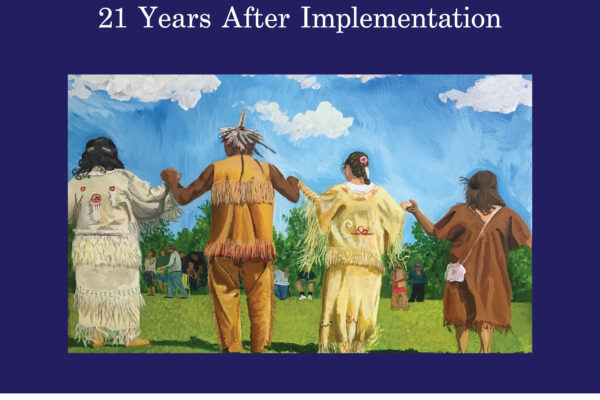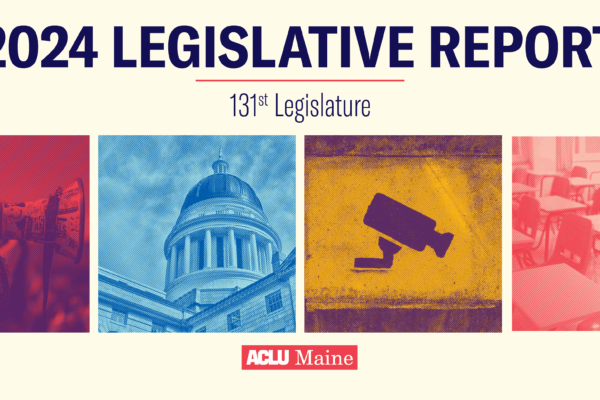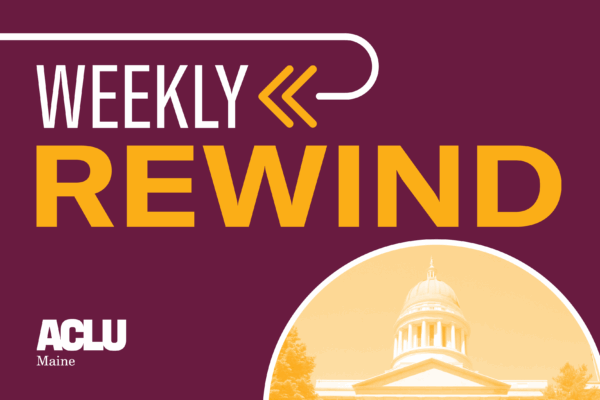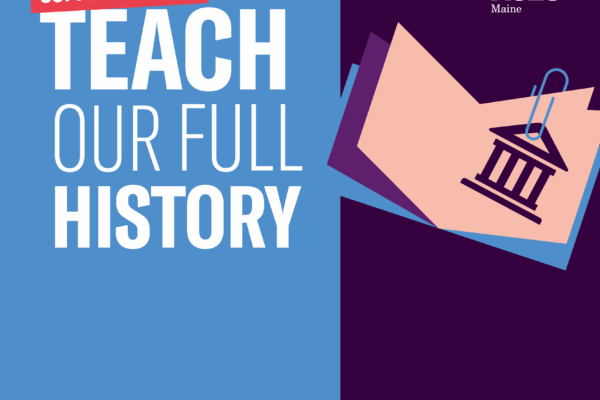The Senate passed LD 2001, following House passage last week. This bill would give teachers and schools the resources they need to teach Wabanaki and African American studies, just as Maine law demands.
AUGUSTA – A coalition of Maine organizations and leaders applauds the Senate’s passage today of LD 2001, following House passage last week. The bill would give teachers and schools the resources they need to effectively teach Wabanaki and African American studies, as required by state law.
The coalition includes Speaker Rachel Talbott Ross, Representative Laurie Osher, and the authors of a 2022 report showing school districts have failed to include Wabanaki studies consistently and appropriately in their curriculum: the Abbe Museum, ACLU of Maine, Maine Indian Tribal-State Commission, and Wabanaki Alliance.
LD 2001 would establish an advisory commission on Wabanaki and African American studies and provide funding for curriculum development and teacher training. This would give consistent and expert guidance to the Department of Education, school administrators, and teachers.
Maine passed a visionary law in 2001 mandating public schools teach students about the Wabanaki, and they built on that law in 2021 by adding African American studies – but this law has not been effectively implemented. Many students have graduated with little or no education about the Wabanaki Nations and African American history. Additionally, Wabanaki and African American students continue to be erased from their own home’s past and present.
The bill now heads to the Special Appropriations Table to be considered for funding. The coalition applauds the majority that supported this important legislation and calls on them to approve funding to fulfill the bill’s promise.
Statement from Rachel Talbot Ross, Speaker of House:
“The stories of Black Mainers and the Wabanaki people are Maine’s history, yet all too often they have been left out of the conversation and the classroom. Establishing the African American and Wabanaki Studies Advisory Council will help educators access the technical support and curriculum development necessary to fully integrate this history as a part of their lesson plans and provide excellent professional development opportunities.
Our students will better understand the resilience displayed in the face of historical injustices and our educators can foster a deeper understanding of the ongoing pursuit of equality. Ultimately, by ensuring that a complete and accurate body of voices and stories is included in the telling of Maine’s story, we can move forward as a more informed and empathetic people.”
Statement from Maulian Bryant, President and Penobscot Nation Ambassador, Wabanaki Alliance:
“The Wabanaki Alliance is thankful for both the strong votes thus far on legislation promoting strengthening the teaching of Wabanaki studies and the opportunity to advance a combined effort with African American studies. We know that when our students are educated with a comprehensive and inclusive model they will thrive and be part of a more informed and compassionate state.”
Statement from Jill E. Tompkins, Executive Director, Maine Indian Tribal-State Commission:
“In 2001, the State of Maine enacted the ‘Wabanaki Studies Law’ to require that education about the history, governments, and cultures of the Wabanaki people be provided to all Maine children. It was believed that this knowledge gap had led to misconceptions about the Wabanaki people and their continued survival. Wabanaki children suffer poor educational outcomes due in part to the fact that their existence and history is not reflected in the standard Maine curriculum. Despite an early robust effort by the Wabanaki Studies Commission, for the next 21 years, most Maine schools failed to provide the required education. LD 2001 will finally ensure that the critical need for Maine's children to be educated about Wabanaki peoples, histories, governments, and unique cultures will be fulfilled.”
Statement from Betsy Richards (Cherokee Nation), Executive Director and Senior Partner with Wabanaki Nations, Abbe Museum:
“We believe that teaching Wabanaki and African American histories is necessary for building a more united and inclusive Maine. The Abbe stands by the intentions of this legislation and feels that it is a necessary part of overcoming centuries of barriers to equity, opportunity, and understanding."
Statement from Michael Kebede, Policy Counsel, ACLU of Maine:
“Teaching Wabanaki and African American studies is not optional, but our schools and teachers need the necessary resources to follow the law. LD 2001 will give all students the opportunity to learn the complete and truthful history of this place we all call home. This will improve outcomes for all students, regardless of race, ethnicity, or ancestry. Students who identify as Black, Indigenous, or people of color are more connected to their studies when they are accurately represented in the coursework, leading to better educational outcomes and self-esteem. Other students are better prepared to grow into actively engaged citizens when they learn accurate information about the state’s past and present.”
Statement from Laurie Osher, Maine State Representative (District 25):
“Maine students' education should include Wabanaki and African American Studies: history, contributions, knowledge, triumphs, and also discrimination that members of both groups have experienced. At present, Wabanaki Studies and African American Studies course content is only available in a handful of Maine classrooms in only a few Maine schools and there is no oversight on the educational curricula. LD 2001 will address these gaps by giving schools and teachers the guidance and resources needed.”
Related Content

Wabanaki Studies Law: 21 Years After Implementation

2024 Legislative Report: Protecting and Expanding Civil Liberties at the State House

The Week in Augusta: Feb. 26 – Mar. 1

Coalition Calls for Final Passage of Wabanaki, African American Studies Bill
Stay Informed
Sign up to be the first to hear about how to take action.
By completing this form, I agree to receive occasional emails per the terms of the ACLU’s privacy statement.
By completing this form, I agree to receive occasional emails per the terms of the ACLU’s privacy statement.

